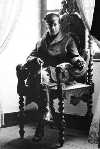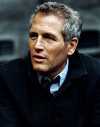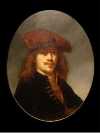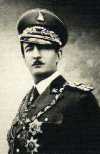 Still regularly performed, Der Rosenkavalier is one of the most acclaimed comic operas of Richard Strauss, the leading composer of romantic opera in the early 20th century. It is loosely based on the works of Molière and Louvet de Couvrai and tells the story of the shifting romantic attachments of four principal characters. Strauss, who often abandoned tonality to emphasize the humor or drama of a scene, composed Der Rosenkavalier in collaboration with what poet? Discuss
Still regularly performed, Der Rosenkavalier is one of the most acclaimed comic operas of Richard Strauss, the leading composer of romantic opera in the early 20th century. It is loosely based on the works of Molière and Louvet de Couvrai and tells the story of the shifting romantic attachments of four principal characters. Strauss, who often abandoned tonality to emphasize the humor or drama of a scene, composed Der Rosenkavalier in collaboration with what poet? Discuss
Source: The Free Dictionary

 Newman was an American actor who captured the darker, less heroic aspects of his best-remembered roles, such as those in The Hustler, Cool Hand Luke, Butch Cassidy and the Sundance Kid, and The Sting. After eight nominations, he finally won an Academy Award for The Color of Money in 1986. In 1982, he launched his “Newman’s Own” line of food products, donating the profits to various charitable causes. Why was Newman once placed on Richard Nixon’s enemies list?
Newman was an American actor who captured the darker, less heroic aspects of his best-remembered roles, such as those in The Hustler, Cool Hand Luke, Butch Cassidy and the Sundance Kid, and The Sting. After eight nominations, he finally won an Academy Award for The Color of Money in 1986. In 1982, he launched his “Newman’s Own” line of food products, donating the profits to various charitable causes. Why was Newman once placed on Richard Nixon’s enemies list?  In his book The Day After Roswell, US Army Lt. Colonel Philip Corso claims he participated in the study of extraterrestrial technology recovered from the alleged 1947 Roswell UFO crash. According to Corso, the reverse engineering of these artifacts indirectly led to the development of accelerated particle beam devices, fiber optics, lasers, integrated circuit chips, and Kevlar. Corso also claimed knowledge of a covert government group that had been tasked with what?
In his book The Day After Roswell, US Army Lt. Colonel Philip Corso claims he participated in the study of extraterrestrial technology recovered from the alleged 1947 Roswell UFO crash. According to Corso, the reverse engineering of these artifacts indirectly led to the development of accelerated particle beam devices, fiber optics, lasers, integrated circuit chips, and Kevlar. Corso also claimed knowledge of a covert government group that had been tasked with what?  The Emmy Awards are given for outstanding achievement in US television. They are presented by the National Academy of Television Arts and Sciences, which was founded in 1946 and which held the first award ceremony in 1949. Its members vote on outstanding programs, actors, directors, and writers in such categories as drama, comedy, and variety. The Emmy’s name is taken from the nickname “immy” for the image orthicon, a television camera tube. Who won the very first Emmy?
The Emmy Awards are given for outstanding achievement in US television. They are presented by the National Academy of Television Arts and Sciences, which was founded in 1946 and which held the first award ceremony in 1949. Its members vote on outstanding programs, actors, directors, and writers in such categories as drama, comedy, and variety. The Emmy’s name is taken from the nickname “immy” for the image orthicon, a television camera tube. Who won the very first Emmy?  Burns Night is the anniversary of the birthday of Scottish poet
Burns Night is the anniversary of the birthday of Scottish poet  A student of Rembrandt, Flinck was a Dutch painter who is remembered mainly for his numerous portraits, many of which are held in the Rijks Museum in Amsterdam. Among his most famous works is the Blessing of Jacob, one of his many religious subjects. However, Flinck was also known for painting scenes from history, such as the Peace of Münster, which illustrates the famous treaty with 19 life-size figures. Flinck even painted his own likeness in the canvas. Where is it?
A student of Rembrandt, Flinck was a Dutch painter who is remembered mainly for his numerous portraits, many of which are held in the Rijks Museum in Amsterdam. Among his most famous works is the Blessing of Jacob, one of his many religious subjects. However, Flinck was also known for painting scenes from history, such as the Peace of Münster, which illustrates the famous treaty with 19 life-size figures. Flinck even painted his own likeness in the canvas. Where is it?  Zog I, born Ahmet Zogolli, was president of Albania from 1925 to 1928 and king from 1928 to 1939. During the worldwide depression of the 1930s, Zog’s government became almost completely dependent on Italy. Ultimately unable to check Italian dictator Benito Mussolini’s increasing control over his country, Zog was forced into exile. He formally abdicated in 1946, when Albania became a communist republic after WWII. How many assassination attempts is Zog said to have survived during his reign?
Zog I, born Ahmet Zogolli, was president of Albania from 1925 to 1928 and king from 1928 to 1939. During the worldwide depression of the 1930s, Zog’s government became almost completely dependent on Italy. Ultimately unable to check Italian dictator Benito Mussolini’s increasing control over his country, Zog was forced into exile. He formally abdicated in 1946, when Albania became a communist republic after WWII. How many assassination attempts is Zog said to have survived during his reign?